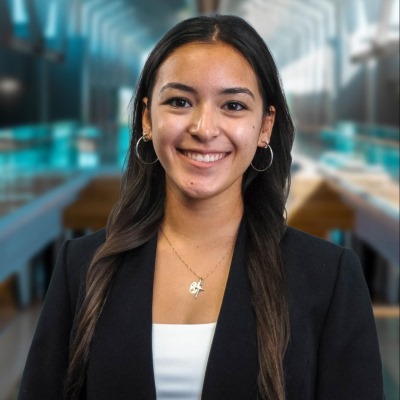Fall 2025 Winner of the Dreams Without Borders Scholarship
Yazmin Aliyah Torres
Yazmin is extremely driven to make improvements to the employment-based immigration policy process. She ultimately wants to use this concept to modernize immigration laws. Congratulations, Yazmin, we admire your dedication to making a difference!

Read her essay:
As a second-generation American, I’ve been fortunate to grow up with opportunities that my immigrant mother and grandparents never had. Because of their hard work and perseverance, I was able to experience a childhood filled with stability, education, and growth—things many might consider “normal,” but that were hard-earned in my family’s case. Even so, I’ve witnessed their quiet strength, whether it was studying with my grandparents for the citizenship test or talking through my mom’s past to get her through a hard day. Though I was born here, their experiences became part of mine, shaping my identity and fueling my commitment to improving the immigration system.
One area of immigration law that I believe urgently needs improvement is employment-based immigration policy, specifically the outdated visa job classifications and quotas that Congress has not substantially revised in over 30 years. Our system still relies on job lists that are decades old, featuring positions that no longer exist or are no longer relevant in today’s economy. Meanwhile, emerging and critical fields like Software Engineering, AI development, cybersecurity, and data science are underrepresented or missing entirely.
America prides itself on being a land of opportunity, yet our immigration policy limits access to those opportunities by failing to reflect our current economic needs. Many talented individuals around the world, especially from developing countries, are ready to contribute to the U.S. economy but face unnecessary barriers due to outdated policies. Updating the job list for employment visas to include modern professions would not only help fill labor shortages but also enrich the American workforce with diverse perspectives and global talent.
Changes like these would have made a meaningful difference in many families’ journeys. Our immigration system should recognize the full value that immigrants bring, not just as workers, but as individuals with skills, ambition, and a deep desire to contribute. When we overlook that potential, we don’t just limit their futures—we limit the nation’s. To positively affect the lives of future immigrants, I envision a comprehensive reform that includes regular reviews and updates of job categories on visa lists, increased visa caps based on labor market demands, and a faster, more transparent application process. These improvements would give skilled workers a clearer path to permanent residency and citizenship, helping them feel valued and included in the communities they serve.
My goal is to work at the intersection of technology and public policy, using data to shape smarter, fairer immigration laws. I want to contribute to a system that acknowledges the reality of modern work and respects the dignity of those who seek to be part of the American dream. I am driven not only by what I’ve seen, but by what I know is possible. Immigration is not just a legal process—it’s a human journey. Improving our laws means recognizing the humanity behind every visa application, every border crossing, and every dream for a better future. In doing so, we strengthen not just immigrant communities but the nation as a whole.





